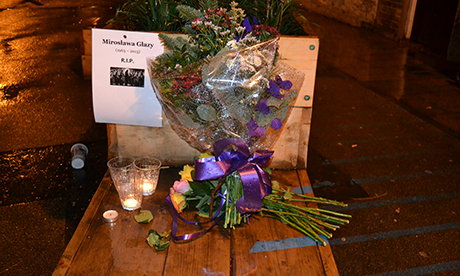Invisible and living on our streets: the plight of Hackney’s homeless

Narrow Way vigil in memory of Miro Glaza (1963-2013). Photograph: Josh Loeb
It’s the first meal of the New Year at the Round Chapel’s Sunday soup kitchen in Lower Clapton.
Volunteers are chopping parsnips and peeling oranges for fruit plates while guests help themselves to tea and coffee served from giant blue pots.
Brother Johannes Maertens rushes through the hall cradling industrial-size bottles of Branston Pickle and mayonnaise for the day’s sandwich selection, clad in trainers, tracksuit bottoms and a green hoodie.
A wooden cross hangs around his neck.
At 3pm a hearty kale, potato and carrot soup is served, followed by dessert and fruit.
This weekly meal is served to 40-50 guests per week, not all of them homeless.
As the hall starts to fill up, a cheerful elderly woman in a head scarf, one of very few females, takes a seat next to two men in black coats, their hands clutched around cups of tea.
Another table is crowded with a group of jovial, red-faced men, while others sit quietly on their own. An effervescent young man tours the room, extending his hand and saying: “Happy New Year!”
It was at this soup kitchen one Sunday in November that some of Miroslaw Glazy’s friends and acquaintances heard of his death.
He had been sleeping on the steps of the Round Chapel during the harshest winter months.
The soup kitchen offers a semblance of community, and a temporary reprieve from hunger.
But addressing the deeper core of homelessness is another matter: “Losing connection with society. It’s easier to get there than we think,” reflects Brother Maertens.
A few weeks ago Brother Maertens was called to duty to address an altogether less straightforward cause – to officiate a vigil for Mr Glazy, known as Miro Glaza, who was fatally assaulted off the Narrow Way
on 1 November.
On a rainy night in December, the group London Catholic Worker, having sent around a mass email invitation, gathered together a group of people to honour the life of a relative stranger.
Most of the attendees had never set eyes on Miro before, and there was no photograph of him available to display.
The vigil was the “last thing we could do for Miro, to speak his name in dignity,” says Brother Maertens.
A group of the deceased’s friends showed up late and poured a sip of his favourite cider over the memorial site, which had been set up on a wooden bench-cum-flowerbed, part of the council’s regeneration efforts in the Narrow Way, which uncannily resembled a modest coffin.
Jakub, a Polish migrant who has managed to secure residence in a squat, knew Miro for years but “only learned his surname this evening”. Miro’s death saddened him, but reports of violence within the homeless community came as no surprise.
“We drink together, we fight together,” Jakub shrugged. “Sometimes for no reason at all.”
Piecing together the details of Miro’s life has proved challenging even for those who made an effort to find out more. “We know little about what happened – what his last thoughts and feelings were,” says Brother Maertens.
Miro had been a patient at the Greenhouse clinic in Tudor Road, near Victoria Park, since 2011. The clinic holds regular drop-in sessions for Eastern European migrants, providing health and housing advice as well as coffee and cake.
A source at the clinic said that cases of violence and abuse towards the homeless are “not uncommon” and that once or twice a month a rough sleeper will come to the clinic having been assaulted in their sleep.
In November one local rough sleeper was apparently treated for second degree burns after having acid thrown on him as he slept.
Incidents like these are unlikely to be reported. Becoming known to the police puts migrants at risk of being deported for failing to exercise their Treaty rights, which require residents from the European Economic Area to be self-supporting, actively seeking work, studying or retired.
And while the Hackney Winter Night Shelter offers a bed and a hot meal for 25 guests per night from November to March, demand for places often outstrips supply.
The shelter volunteer team assists guests in securing permanent public housing, to which migrants have no recourse – leaving them to navigate the private sector only.
Voluntary services across Hackney can fill in some of the gaps left behind by a life sleeping rough. But for the migrant homeless, breaking the cycle is particularly challenging, and seeking dignity in death almost impossible.
Related:
